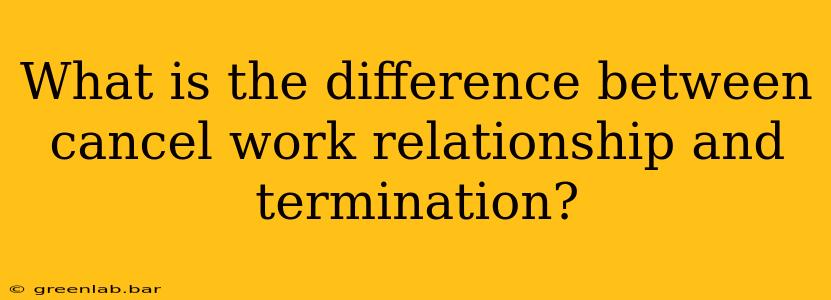The terms "cancel work relationship" and "termination" are often used interchangeably, leading to confusion. While both signify the end of an employment or contractual relationship, there are crucial distinctions in their implications, context, and legal ramifications. This article will delve into these differences, clarifying the nuances of each and providing practical examples.
What is a Cancelled Work Relationship?
A "cancelled work relationship" is a less formal and often less legally defined term. It usually implies a mutual agreement to end the working relationship, where both parties consent to its dissolution. This approach avoids the more formal and potentially adversarial processes associated with termination. It often arises in situations like:
- Freelance or contract work: A client might "cancel" a project midway, perhaps due to budget constraints or changing project needs. The freelancer, in turn, agrees to cease working and may negotiate payment for completed work.
- Informal arrangements: In less structured work scenarios, such as short-term assignments or collaborations, the parties might agree to discontinue the work relationship without formal documentation or legal processes.
- Mutual agreement during probation: An employer and employee may mutually agree to end the employment relationship during a probationary period. This may avoid the need for a more formal termination process.
It's important to note that even a cancelled work relationship might still have legal implications regarding payment for completed services, intellectual property rights, or confidentiality agreements. While less formal, clear communication and potentially written documentation are beneficial to avoid future disputes.
What is Termination?
Termination, in contrast, signifies a more formal and often unilateral ending of a work relationship. It's usually initiated by either the employer or the employee, and often involves a more structured process, including:
- Employer-initiated termination: This can involve various reasons, including poor performance, misconduct, redundancy, or restructuring. Depending on the jurisdiction and the employment contract, the employer may be required to provide notice, severance pay, or other benefits. This is often referred to as "dismissal."
- Employee-initiated termination: This is commonly known as resignation or quitting. The employee typically provides a formal notice period, as stipulated in the employment contract or dictated by company policy.
Termination usually implies a more defined legal framework, with established rights and obligations for both parties. This includes potential legal recourse for wrongful dismissal or breach of contract.
Key Differences Summarized:
| Feature | Cancelled Work Relationship | Termination |
|---|---|---|
| Formality | Less formal, often informal agreement | More formal, often involving legal processes |
| Initiation | Usually mutual agreement | Can be initiated unilaterally by employer or employee |
| Legal Process | Fewer formal legal implications, though some may exist | Often involves established legal rights and obligations |
| Notice Period | Often no formal notice period required | Notice period usually required, depending on contract |
| Severance | Severance pay less common | Severance pay often applicable depending on circumstances |
Conclusion:
Understanding the difference between a cancelled work relationship and termination is crucial for both employers and employees. While "cancelled work relationship" suggests a more amicable and informal conclusion, "termination" implies a more formal and potentially legally complex process. Clear communication, proper documentation, and, when necessary, legal advice are essential in navigating both scenarios successfully.

